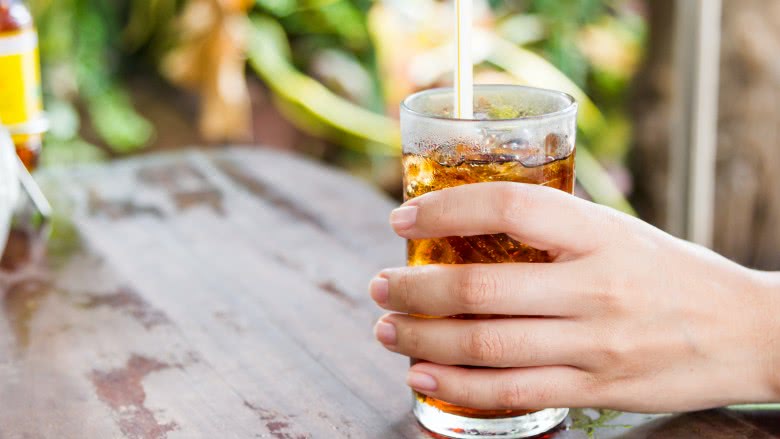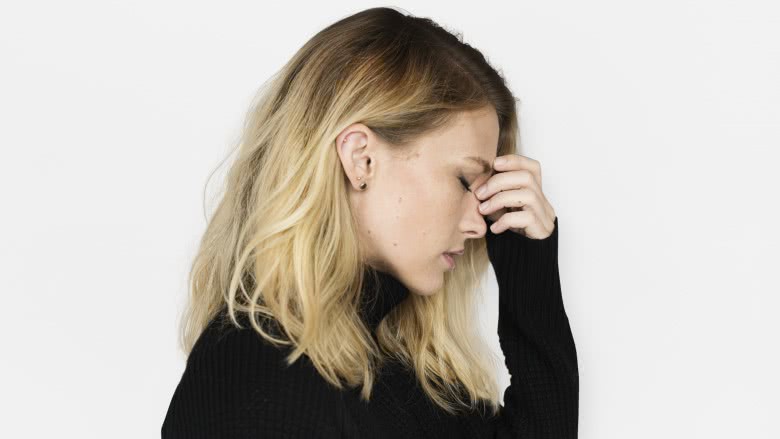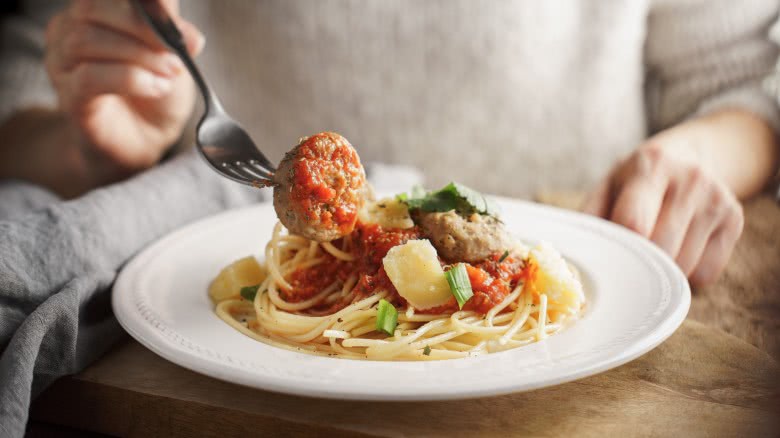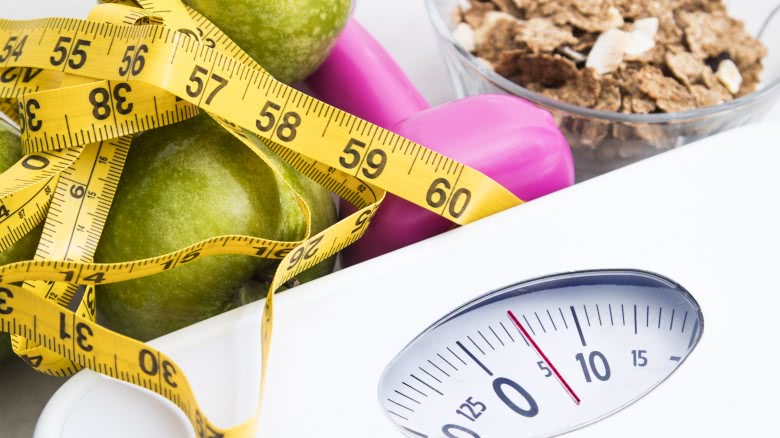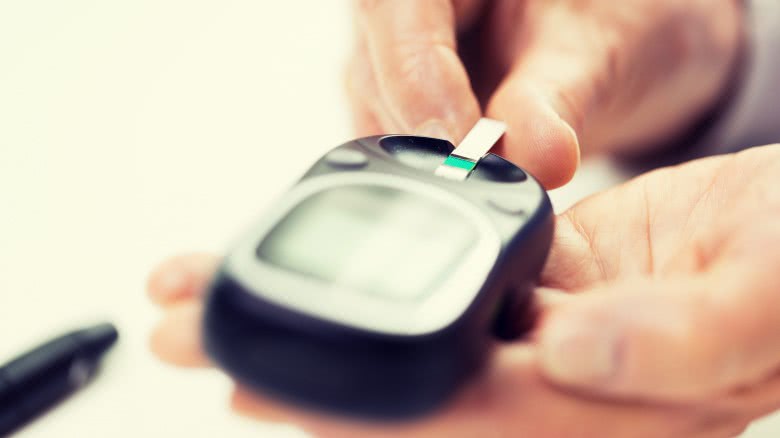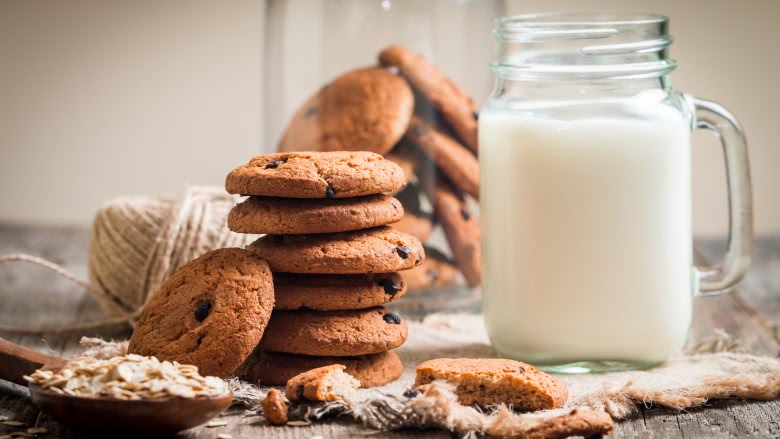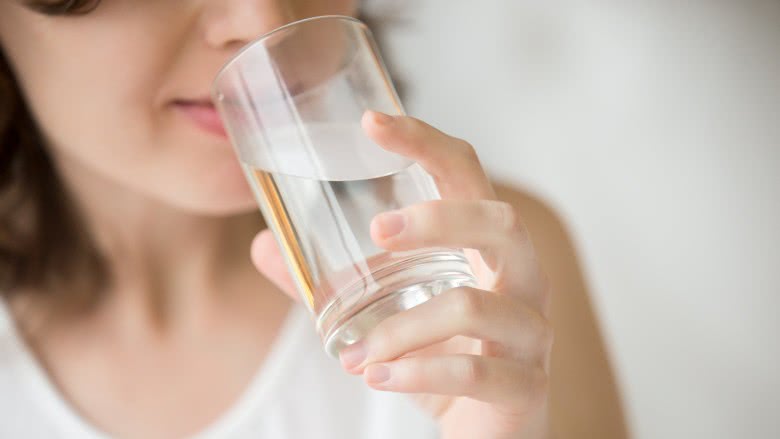Things That Happen When You Stop Drinking Diet Soda
I used to be a diet soda addict. In college, instead of displaying empty beer bottles like the guys down the hall, my roommates and I proudly showcased empty bottles of diet soda. We were obsessed, and the more I drank, the more I wanted it. Fortunately, after college I traded the late nights and diet soda at breakfast for eight hours of sleep and more water.
Even now that I'm working, and home with two young children, I have more energy than I did in college, and I know it's because I'm taking care of myself. Here are just a few of the changes you could experience when you put the diet soda down.
Why it's time to cut back
Diet soda seems harmless, but it's doing some damage. Not only is it affecting your internal organs, it's actually changing your eating patterns. The Vitamin Shoppe nutritionist Jaclyn Jacobsen spoke with me about the many risks of drinking diet soda.
The ingredients in diet soda are associated with "decreased kidney function, fat accumulation around the waistline, and increased sugar cravings," Jacobsen told me. "Diet soda puts you at increased risk for metabolic syndrome, which is an umbrella term for multiple conditions such as high blood pressure, elevated cholesterol, elevated blood sugar that increases the risk of heart disease, stroke, and diabetes."
You may go through withdrawal
Once you make the commitment to give up diet soda, don't be surprised if you feel worse before the benefits happen. Your body has been used to this foreign substance, and it is going to miss your bubbly little friend.
"The body can go through a withdrawal from both the artificial sweetener and the caffeine for a period of one week to one month, depending on how much you have consumed and for how long," explained Jacobsen. "Symptoms include anxiety, appetite changes, mental fogginess, mild depression, fatigue, headaches, joint pain, and restlessness." Once this initial hungover feeling passes, you should start feeling better.
Food will taste better
Did you know your diet soda can actually affect the way all other foods taste? Once you cut it out completely, don't be surprised if your favorite foods start to taste a bit better.
"Diet soda weakens bones, increases our threshold for sweetness, and damages brain health," Lisa Cohn, registered dietitian for miVIP Surgery Centers, told me. "In addition to bad breath, some people also report negative effects on taste, and when they reduce consumption of diet beverages, they find improvement and better flavor in foods."
You'll lose weight
Here's the great diet soda paradox. Most diet drinkers think they are doing the right thing for their waistlines when they pass on the sugary cola and stick with their zero-calorie drink. However, even though diet soda is calorie-free, its other ingredients can make it easy for you to gain weight.
"Although diet sodas are aimed at those looking to manage their weight and achieve weight loss, they are often the number one culprit sabotaging your diet," health, fitness, and nutrition expert Jenny Abouobaia told me. "A number of studies have shown that drinking diet soda actually increases the amount of food you eat, as the artificial sweeteners cause you to crave sugary foods, thus, in turn leading to weight gain." When we drink diet soda, since it tastes sweet, our bodies get ready for sugar. When that sugar never comes, our bodies start craving the real stuff.
"Artificial sweeteners have been shown to increase appetite and to disrupt the hormones that signal fullness," Dan DeFigio, nutrition expert, and bestselling author of Beating Sugar Addiction For Dummies told me. "Drinking artificially-flavored substances desensitizes your taste buds to sweetness, so you end up craving more sugar and sweet tastes." Once you give up the diet stuff, you may notice that your Friday morning muffin tastes a lot sweeter than usual. You may not even want the whole thing!
You'll lower your risk for type 2 diabetes
We often think of sugar and junk food as putting us at higher risk for type 2 diabetes. Prediabetic men and women are usually told to stop drinking regular soda, because all that sugar is wreaking havoc on their blood sugar levels.
However, it's not just sugary beverages putting you at risk for chronic diseases like diabetes. Many of us assume the sugar is the problem, but artificial sweeteners are just as bad. A study in the American Journal of Clinical Nutrition studied the effects of artificial sweeteners, like the ones found in diet soda, on over 66,000 women and found that both sugar and diet drinks increase one's risk for diabetes.
Say bye bye to bloat
If you've been drinking diet soda as a way to cut back on calories and get that summer bod in shape, try replacing it with water instead. Drinking diet soda can lead to bloating, which is never a good look.
"When I personally decided to cut [diet soda] out totally, the first thing I noticed was that I was less bloated all of the time, and my teeth were suddenly much whiter," Abouobaia told me. "Also, I noticed that I had less food cravings and could manage my hunger better."
Your cravings will lessen
If you've fallen into the habit of craving a diet soda and chocolate chip cookie every afternoon, you're not alone. The artificial ingredients in diet soda make anyone who drinks it crave more sugar. Once you cut out the soda, you should notice your cravings calming down.
"The taste of sweet does cause the release of insulin, which lowers blood sugar, and if carbohydrates are not consumed, it causes a drop in blood sugar, which triggers hunger and cravings for sugar," diet and fitness expert Dr. Melina Jampolis told CNN.
Your appetite will change
Once you give up your diet soda habit, you will most likely feel less hungry during the day. And you won't just be craving less sugar. You will probably crave less food altogether. This is because of the way diet soda ingredients affect appetite. A study in Appetite looked at the effects of diet soda on appetite and cravings. Researchers found that study participants who drank Sprite Zero daily were almost three times more likely to choose candy over gum or water than those who didn't drink a diet beverage.
"Artificial sweeteners affect our sense of satiety," nutritionist Isabel Smith, MS told Eat This Not That. "Our bodies have evolutionarily developed to expect a large amount of calories when we take in something exceedingly sweet, and those artificial sweeteners are from 400 times to 8,000 times sweeter than sugar."
Once your body prepares for all the sugar it thinks it's going to get from diet soda, it needs to get it from somewhere. "The muscles in your stomach relax so you can take in food, and hormones are released. With artificial sweeteners, your body says, 'Wait a minute, you told me you were going to give me all this high-calorie food,'" Smith explained. "It can actually send some people searching for more food, out of lack of satisfaction." That's why drinking a diet soda in the afternoon can leave you craving a bagel an hour later.
You'll feel happier
You know those people in the diet soda commercials? They are laughing with friends, riding bikes together, and skipping along the beach. They are extremely happy, and it's all because of that delicious drink in their hands! The only problem is that drinking diet soda can actually make you feel worse. If you've been feeling blue, consider cutting out the diet soda.
A study in PLoS One found that drinking diet drinks may put older adults at higher risk for depression. Researchers also found that coffee and tea drinkers who did not sweeten their drinks had lower rates of depression. Black please!
You'll get sick less
Did you just come down with the sniffles again? It may not just be your kindergartener bringing home the germs. Your immune system is affected by the artificial sweeteners in diet soda, and will start working better once you cut it out.
"Researchers are finding that artificial sweeteners may affect our healthy gut bacteria, which can affect everything from blood-sugar control, to weight management, to disease — how our immune system works and how our body responds to infection," Smith told Eat This Not That.
Your baby will be healthier
When I was pregnant, I had a hard time cutting out the caffeine completely. I allowed myself the occasional coffee or diet soda to be able to make it through the afternoon without falling asleep at my desk. While the occasional diet soda was probably fine, drinking it every day would have put me and my baby at risk.
A study in the American Journal of Clinical Nutrition studied the effects of diet soda on pregnant women in Denmark. Researchers found that pregnant women who drank diet soda every day had a higher risk of preterm labor than women who did not drink it. Interestingly, the regular soda drinkers were not at increased risk for preterm labor.
You'll have more energy
More energy was the biggest change I noticed once I cut out the diet soda. I noticed that not only was it easier to get out of bed in the morning, but I also wasn't hitting that 4pm slump every afternoon.
"Drinking too much caffeine can make you dehydrated, and it can overstimulate the nervous system, making you fatigued and exhausted," Smith told Eat This Not That. "I find that when people cut back on caffeine they have more energy because the caffeine causes very big highs and lows."
This change surprised me, because I had been drinking diet soda to get more energy every afternoon! However, even though it has caffeine to perk you up, the other ingredients are only wearing you down. "There is way more energy for our bodies in real food than in processed foods," Smith explained. "When people cut back on processed items, they often look for more fresh foods and make better choices. By giving up soda, it may seem like you're making one change, but it can actually change a couple aspects of your diet for the better."
Your teeth will be healthier
We all know that sugary drinks like fruit punch or regular soda are bad for our teeth. The sugar will eat away at our enamel, putting us at higher risk for cavities. However, it looks like diet soda is just as bad.
When Australian dental researchers looked at the effects of both regular and diet soda on teeth, they found that both drinks damaged teeth. Cut out the diet soda for healthier, whiter teeth.
You won't be such a light weight
Say you're going out for a night on the town with your friends, but you've been trying to eat healthier. You may opt for a vodka diet instead of mixing your liquor with a sugary soda or drink. Don't be surprised if you seem drunker than your friend drinking a beer. A study in the journal Alcoholism Clinical and Experimental Research found that mixing liquor with diet soda resulted in a higher blood alcohol level in both men and women than using other mixers.
If you plan to mix your drinks with diet soda, remember that you're going to feel the effects a lot faster.
Trick yourself
So you're ready to cut out the diet drinks? Great! The only problem is that it can feel so hard. One of the easiest ways to start is with tiny changes.
"The best way I've found is to initially switch from my favorite brand (we all have one right?) to a diet soda that I didn't love so much. This way I was still feeding my craving for soda, but it was easier to cut down," Abouobaia told me. "Eventually I cut right down until I swapped it out for a naturally flavored water. Filling a pitcher with water and leaving it in the fridge with some lemon slices, cucumber slices and mint leaves makes a really refreshing drink that you won't even miss that soda fizz."
How to quit
The experts I spoke with all recommended to start cutting back your diet soda intake with a goal of quitting it altogether. Take small steps to avoid becoming overwhelmed. Start with simply drinking more water. Jacobsen recommended focusing on drinking more water, including flavored seltzers as long as they contain no additional sweeteners. "Eat a diet rich in healthy monounsaturated fats and organic protein sources as these two macronutrients can help to avoid sugar cravings because they keep blood sugar stable," she told me.
You could also try slowly cutting down on the amount of diet soda you're drinking. "A good way to cut back and eventually quit drinking diet soda is to reduce your portion size," recommended Cohn. "At the beginning, space out smaller portions and set a goal to only drink eight to 12 ounces of soda once a week."
Cohn also recommended eating a healthy diet to make this change easier and avoid your tastebuds getting confused. "Make sure you're eating regular meals and incorporate more water, seltzer, and herbal teas into your daily routine," said Cohn. "Avoid foods with artificial sweeteners so your palate and body are cleansed and add more fresh herbs, spices, citrus and fruits with real flavor to your diet. It's also beneficial to increase your exercise if you're sedentary and moderate your caffeine intake for energy or performance."

